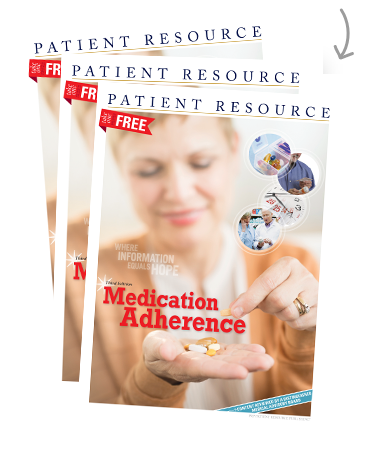Medication Adherence
Ensure taking your medications correctly is a priority
Advances in cancer treatment have made oral therapies (pills) an option for many types of cancer. If your doctor prescribes an oral therapy, you will likely enjoy the convenience of taking a pill instead of going for treatment that may take up to several hours. Oral therapies also offer some level of control at a time when you may feel like you have very little control over anything, but along with these benefits comes responsibility. It is crucial to take your medications exactly how your doctor instructs. To be fully effective, every dose must be taken with the same kind of accuracy, precise timing and safety precautions as infusions and injections. This is known as medication adherence.
Most cancer therapies are designed to maintain a specific level of drugs in your system for a certain time based on your cancer type and stage, your overall health, previous therapies and other factors. If your medications aren’t taken exactly as prescribed, or if you miss appointments for your IV infusions or injections, the consequences can be serious — even life-threatening.
Not taking your medication correctly is called non-adherence, and it happens more often than you may realize. Even with the best intentions, it is easy to get off track, especially if you take multiple medications at different times.
Any change to a treatment regimen, no matter how small, can be disruptive. Getting off schedule, missing doses, taking an incorrect dosage or not following the instructions can lead to increased side effects, treatment delays or hospitalization. The most serious consequence of non-adherence is a poor outcome, such as cancer progression or recurrence.
Before starting your medications, make sure you fully understand instructions for how and when to take them. Your doctor, nurse navigator and pharmacist are excellent resources. Also ask how other medications you currently take may interact with your cancer therapy.
Many tools are available to help you take your medications the way they are intended:
- Use a medication tracker to note each dose and each dose missed. Share your tracking form with your doctor so trends can be addressed right away.
- Detail any side effects. If you are tempted to skip a dose to avoid side effects, don’t. Talk with your doctor, nurse or pharmacist about ways to manage the effects, and never make changes to your dosage or schedule on your own.
- Set up medications in a pill organizer.
- Use a medication reminder tool, such as an alarm on your clock or phone. Download a free smartphone app.
- Ask your caregiver, family member or friend to help you remember when to take your medications and to track them.
Why is it important?
Taking your medication exactly as prescribed by your doctor is important in the fight against cancer because it can influence the effectiveness of your medication during treatment. Most anti-cancer drug regimens are designed to maintain a specific level of drugs in your system for a specific duration of time, based on your cancer type, stage, previous treatments and several other factors. Non-adherence can lead to unnecessary side effects, physician visits, hospitalizations and even cancer progression.
What are common causes for non-adherence?
Research shows that of all the patients taking medications for chronic illnesses, approximately half aren't taking them exactly as prescribed by their doctor. In a national survey, one-third of cancer patients admitted they didn’t always follow the regimen exactly, with more than half admitting they occasionally forget to take a dose. Other known reasons for non-adherence include skipping doses to avoid side effects; splitting doses to save money; not filling (or refilling) prescriptions because of high copays or lack of insurance; complex and confusing treatment regimens; a lack of understanding of the actual purpose of the drug; or a belief that the treatment is unnecessary (especially in patients without symptoms).
A different form of non-adherence occurs when patients take too much of their medication. This may happen as a result of the misconception that if a treatment works well, two doses will work twice as well, or as a result of taking doses too close together (possibly after missing a dose). This type of medication non-adherence has the potential to be extremely dangerous and can even lead to an increased risk of death.
Most patients start their treatments with the best of intentions, but rates of adherence tend to taper off over time. For example, medication adherence for women taking tamoxifen for breast cancer is generally high during the first year but gradually decreases over the five years of recommended therapy—even though it’s proven to reduce the rate of recurrence and extend lives when taken as prescribed.
Many physicians believe that treatment fatigue (the feeling of wanting to escape the confines of cancer treatment) may contribute to reduced medication adherence in individuals with long-term treatment plans. Treatment fatigue may also occur in patients who are not yet willing to accept cancer as a part of their lives.
Six factors for medication adherence
1. The right drug
2. At the right dose
3. At the right time
4. On the right schedule
5. Under the right conditions
6. With the right precautions



